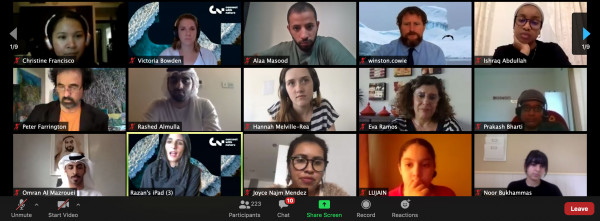
Thursday, June 18th, saw over 226 young people assembled over Zoom, for an engaging session with our esteemed guests HE Razan Al Mubarak, Candidate for the International Union for Conservation of Nature President and Dr. Frederic Launay, CEO of Panthera, around the role of politics in protecting nature.
“You can’t have social justice, when you have environmental injustice” emphasized HE Razan Al Mubarak in her opening statement. The interconnectedness of daily human life and the state of the planet often goes unexamined, but at this point in human history we cannot afford to separate these conversations.
Before the event, we had asked our participants “What action is needed internationally and within the UAE to safeguard species and better protect ourselves from future pandemics?” – 97% thought that conservation of species should be a priority for UAE policy makers.
A dynamic discussion between our esteemed guests and attending youth ensued delving into potential solutions to humanity’s over-exploitation of nature – one of the factors behind the spread of new diseases such as Covid-19 – and how we can better protect ourselves in the future, as well as the measures needed to safeguard the natural world.
While it was unanimous that more awareness is needed to help drive conservation efforts, it was brought into question whether awareness alone can actually drive the action needed, when so much information is already out there a but not enough action resulting from it.
“I am not convinced that more awareness will necessarily lead to more action […] one of the reasons why this may be is that we keep looking at some of those environmental issues as just that; but they’re not necessarily just environmental issues. They’re economic issues, they’re social issues, and perhaps when we reframe the narrative about the environment & nature destruction as value destruction, be it a social value, an economic value and also a natural value, that could be one way [to drive more action]” explained HE Razan Khalifa Al Mubarak.
By honouring it’s cultural significance, we can satisfy our innate desire to emotionally connect with nature and unite through common values. Through dialogue, we should try to understand different viewpoints and use empathy to find common ground in order to effectively collaborate to protect nature locally and globally.
It goes without saying that we must change the way we function and recognize that we are an intrinsic part of nature. When it comes to protecting habitats - the goal is not to partition areas for nature and areas for us, but instead to share and make space for nature. Communities thrive when nature is protected, regardless of whether we are in urban or wilderness areas.
Youth are a very strong voice for nature protection, they need to express what they want to see, what access they want” – Frederic Launay, CEO of Panthera
So, what do the youth of UAE want?
- 61% of attending youth called for stricter laws and regulations to protect wildlife, particularly when it comes to wildlife crime and the trade of live animals.
- 66% felt that the lack of awareness and understanding of risks associated with exploiting nature needs to be addressed as top priority.
- 62% said that broad awareness of education programs like Connect with Nature should be available.
- 66% of the attending youth felt that restoring and protecting the ecosystems should be a top priority in the UAE.
“As daunting as the challenges may seem, there are solutions. Nature conservation works” – Frederic Launay, CEO of Panthera
It was quite evident from the response we got, that our community of youth hope to see increased environmental awareness post Covid-19 and they are ready to help especially when it comes to communicating action that individuals can take. But most importantly, attending youth made it clear that they were ready to contribute to these efforts with 70% of them expressing their willingness to spread the desired awareness, as well as take part in the any research associated with protecting nature.
The youth also agreed that they want to see more focus on a green recovery, and support businesses that facilitate alternative consumption patterns and behavior to halt the destruction of life supporting ecosystems, and provide easy access to alternative products that help us to shift our behavior.
On that note, it is worth mentioning that on June 17th, WWF launched a global advocacy action in response to COVID-19 calling for urgent and systemic action to fix our broken relationship with nature and reduce the risk of future pandemics. This advocacy action is designed to showcase that the COVID-19 health crisis reconfirms how people and nature are interlinked, and how our negative impact on the natural world increases the risk of future pandemics. Download the report by clicking on the link here, to learn what the path forward is for people, businesses, organizations, and governments through case studies, insights, and more.